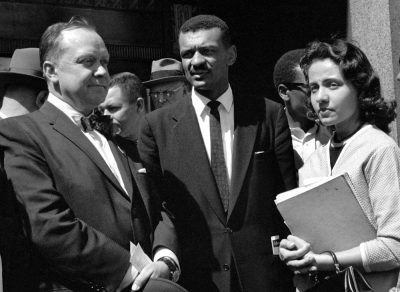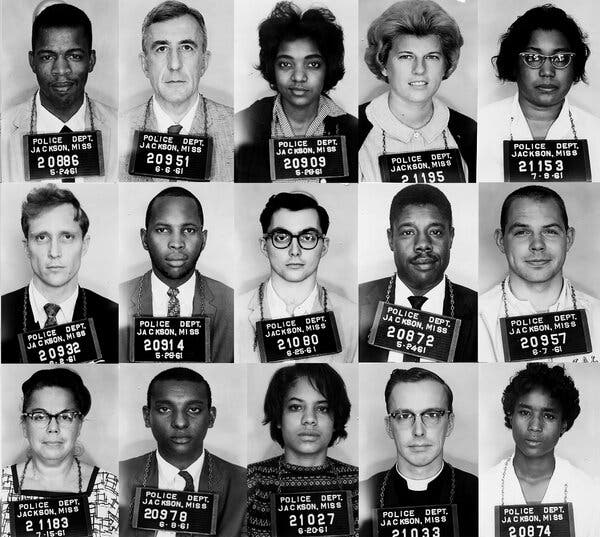Legacies of African American Struggle: Rev. C.T. Vivian and Rep. John Lewis Efforts to Dismantle “Legalized Segregation”
Democratic Party establishment distorts the actual developments of the Civil Rights and Black Power Movements

Two luminaries in the African American struggle which emerged during the 1950s and 1960s, Rev. C.T. Vivian and Congressman John Lewis, passed away on July 17.
Both figures played a prominent role in the efforts to destroy legalized segregation, commonly referred to as Jim Crow, through nonviolent direct action, mass mobilizations and electoral politics.
Nonetheless, since the 1960s, the corporate media and other elements within the capitalist ruling class including the leaderships of the Democratic and Republican parties have never been able to come to grips with the rapid social changes brought about by the political intervention of oppressed peoples. Many contend that the victories surrounding the desegregation of retail outlets, educational institutions, residential areas and access to the franchise would have never occurred if not for the benevolent and perhaps enlightened support of liberals within the Democratic Party.
Former United States Senator and two-time unsuccessful presidential candidate in 2008 and 2016, Hillary Clinton, said as much during her first race to win the nomination when the-then Democratic Senator Barack Obama decisively won the primaries to go on to be elected for two terms. Clinton asserted that if former President Lyndon B. Johnson had not been in office, the Civil Rights Act of 1964 and the Voting Rights Act of 1965 would not have passed in the Congress.
Advancing such notions is tantamount to robbing the masses of their own history. It was the African American people themselves who initiated the Montgomery Bus Boycott of 1955-56, representing a turning point in the quest for equality and self-determination since the conclusion of the Civil War.
Image on the right: Rosa Parks being booked after arrest for violating the segregation laws of Alabama on Dec. 1, 1955
The Montgomery Women’s Political Council under the leadership of organizers such as Mary Fair Burks, Jo Ann Robinson, Irene West, Thelma Glass, and Uretta Adair, printed flyers and made telephone calls leading up to the beginning of the boycott on December 1955. The boycott was prompted by the arrest of Mrs. Rosa L. Parks, a seamstress and veteran activist in various struggles involving civil rights and labor organizing. Parks was arrested on December 1 after refusing to give up her seat in the segregated section of a city bus to a white man. Parks was charged with violating the segregation laws of Alabama. (See this)
In a matter of days, a young minister recently out of graduate school in Boston, Dr. Martin Luther King, Jr., was catapulted into national and international prominence after the Montgomery Improvement Association (MIA) unanimously selected him as the spokesperson for the Black community during the boycott. The homes of King and a neighbor of Parks, Lutheran Minister Rev. Robert Graetz (a white pastor sympathetic to civil rights), were bombed by racists during the boycott, signaling the intransigent resistance to the advancement of African Americans which has continued well into the 21st century. (See this)
From Freedom Now to Black Power
Yet the attempts to revise the actual history of the Civil Rights and Black Power Movements are ongoing as exemplified by the remarks made by former President Bill Clinton at a memorial service for Congressman Lewis. Clinton, known for his signing of the 1994 Crime Bill which resulted in the incarceration of millions of African Americans and other oppressed peoples, suggested the replacement of John Lewis as Chairman by Stokely Carmichael and his supporters in the Student Nonviolent Coordinating Committee (SNCC) at its May 1966 annual conference was a mistake.
Clinton said at the memorial that:
“It must have been painful to lose, but he showed as a young man there’s some things that you just cannot do to hang on to a position because if you do, then, you won’t be who you are anymore. And I say there were two or three years there, where the movement went a little too far towards Stokely, but in the end, John Lewis prevailed.”
Carmichael, later known as Kwame Ture, a graduate of Howard University, had been a member of SNCC since 1960 while studying for his degree. He had been active in various Southern struggles including being sentenced to serve time at the notorious Parchman Prison as a Freedom Rider in 1961, the SNCC campaign in Greenwood, Mississippi, and most famously his organizational work in Lowndes County, Alabama during 1965-66, when the Lowndes County Freedom Organization (LCFO) was formed as the original Black Panther Party.
After the Mississippi Freedom Democratic Party (MFDP) was betrayed by the Johnson administration at the 1964 Democratic National Convention in Atlantic City along with the ratification of the Voting Rights Act the following year, the Watts Rebellion erupted in Los Angeles in August 1965. Both the Southern Christian Leadership Conference (SCLC) founded by Dr. King as well as SNCC headed during 1966-1967 by Carmichael, shifted resources to northern and western urban areas to address the emerging struggles in Chicago, Cleveland, Los Angeles, Philadelphia, etc. The urban rebellions and the widespread registration of African Americans as voters were pivotal factors in increasing the numbers of Black people holding elective offices on a local, statewide and national level.
A leading online publication serving the African American community, Grio.com, quoted several social media responses to Clinton where the former president was condemned for his inappropriate comments. The article said:
“It didn’t take long for Black Twitter to drag the so-called ‘first Black president’ for his remarks. Many felt he had no right to even offer his opinion, much less at the services for Lewis.”
Two Lives Well Lived
Cordy Tindell Vivian was born in Boonville, Missouri in 1924 and later migrated with his family to Macomb, Illinois where he attended elementary and high school. He later matriculated Western Illinois University (WIU) where he worked as a sports editor for the campus newspaper.
C.T. Vivian became involved in the resistance to segregation as early as 1947 when he participated in sit-ins against segregation in Illinois. Vivian later studied for the ministry at the Baptist Theological Seminary in Nashville where he met Rev. James Lawson, a key figure in the crafting of nonviolent direct action tactics. Lawson, who had visited India, was influenced by Ghandi.
Lawson was instrumental in recruiting Vivian, John Lewis, Diane Nash, Bernard Lafayette, among others into the Civil Rights Movement whose student sector would emerge fully in early 1960 in Nashville and other areas of the South. Vivian helped to establish the Nashville Christian Leadership Conference, an affiliate of the SCLC headed by Dr. King.
Alabama state troopers and Dallas County police attack marchers in Selma on March 7, 1965
Vivian was brutally beaten at the aegis of Sheriff Jim Clark in Selma during the early 1965 struggles which led to the passage of the Voting Rights Act. In later years, Vivian served in numerous capacities as a public speaker, co-founder of the National Anti-Klan Network, later known as the Center for Democratic Renewal, along with being a board member of a Black-owned bank based in Atlanta where he eventually settled.
At the time of their deaths, Vivian was 96 and Lewis, 80. Lewis was born as the son of sharecroppers in Troy, Alabama. Lewis was inspired by news of the Montgomery Bus Boycott and the ministry of Dr. King. Lewis also attended the Theological Seminary in Nashville and joined with other youth in initiating the student movement of the 1960s.
Rosa Parks being booked after arrest for violating the segregation laws of Alabama on Dec. 1, 1955
It is important that these historical personalities be placed with the social and political context under which they emerged. The African American struggle for liberation has utilized numerous tactics and strategies since the era of enslavement through the Civil War, Reconstruction and the more modern day efforts to eradicate racism, national oppression and economic exploitation.
*
Note to readers: please click the share buttons above or below. Forward this article to your email lists. Crosspost on your blog site, internet forums. etc.
Abayomi Azikiwe is the editor of Pan-African News Wire. He is a frequent contributor to Global Research.
Featured image: Nashville Mayor West with C.T. Vivian and Diane Nash in 1960; all images in this article are from the author




